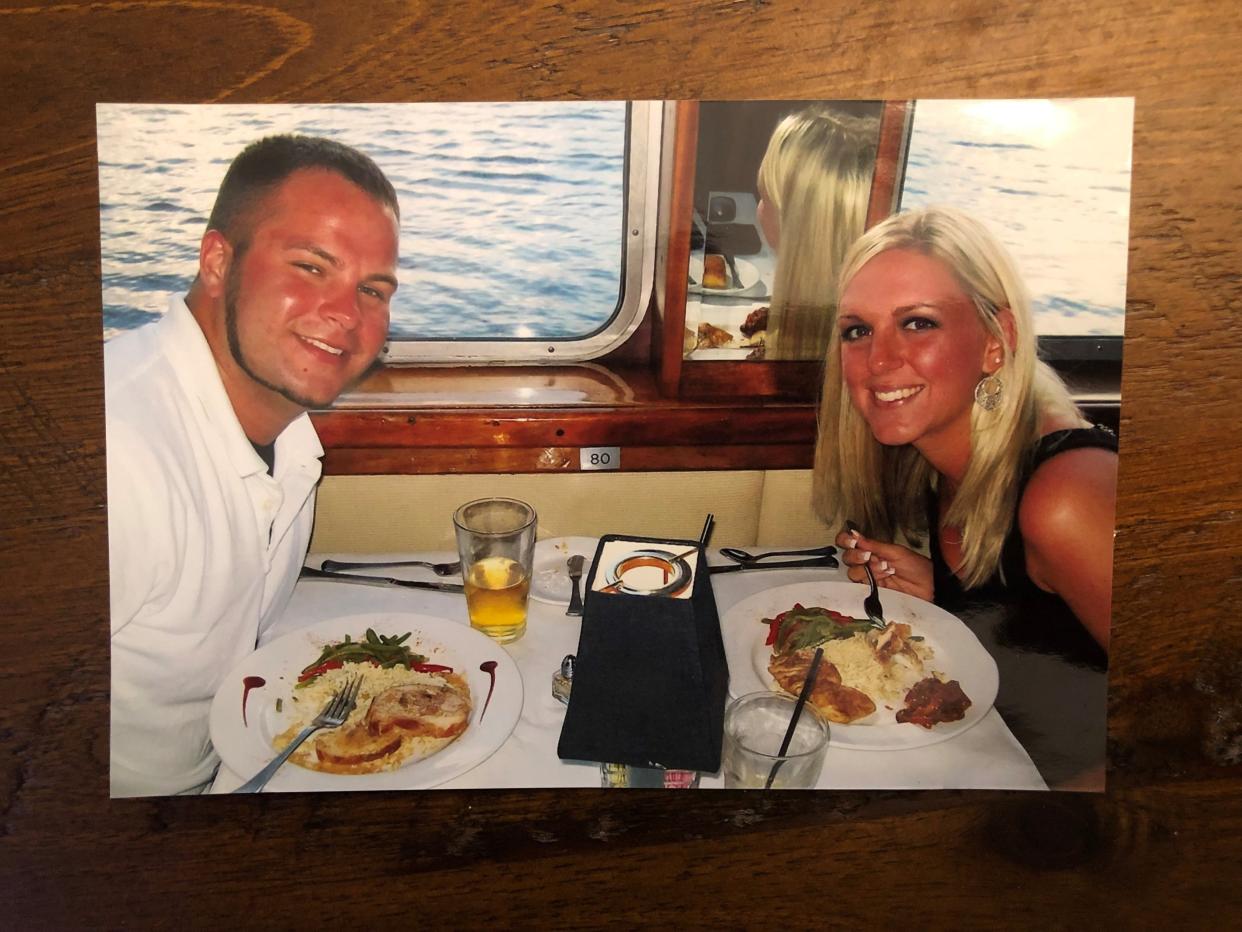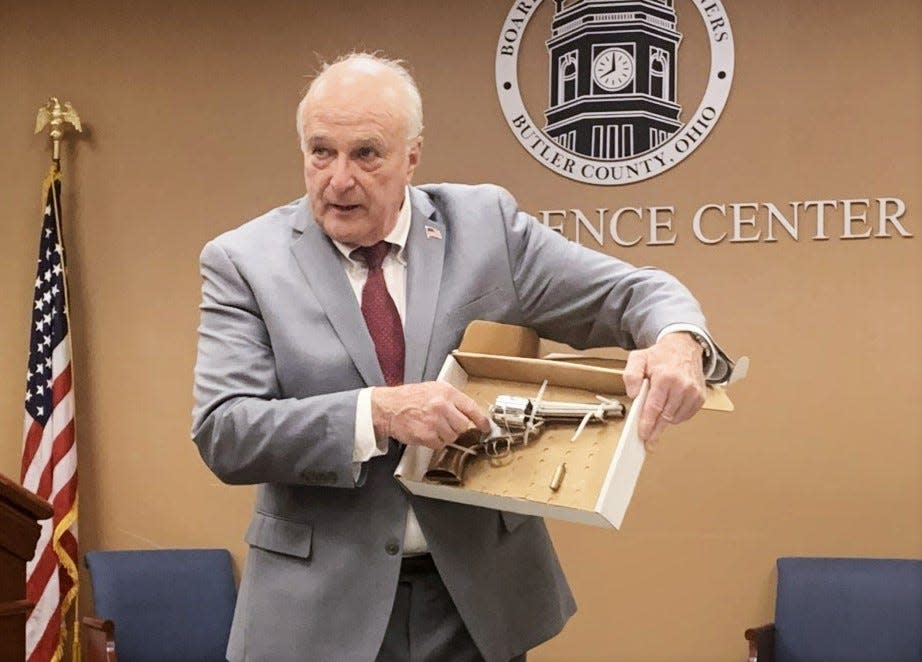Wife of man killed by Monroe police sues city, hospital

Dustin Booth was shot and killed by Monroe police officers on Feb. 11. On Tuesday, his wife sued the city of Monroe and Atrium Medical Center over the death.
The lawsuit filed in U.S. District Court also names Atrium physician Dr. Johnathan Lazzara, Monroe Police Chief Robert Buchanan and six officers: Drew Aspacher, Aaron Ledford, Fred Doughman, Sgt. Caleb Payne, Capt. Brian Curlis and Lt. Mike Rosenbalm.
According to several investigations and his own family, Booth was weeks into a mental health crisis when he was killed. He was 35.
The weeks leading up to the shooting
In January, Booth began talking about conspiracy theories and stating he was a god, according to the lawsuit. As the behavior escalated, Booth's wife Brandi and his mother called police on Feb. 1 and were able to get him admitted to the hospital.
He was released from the hospital on Feb. 7.
"When Dustin was discharged, (his wife) was told that Atrium could no keep him any longer because he was not a threat to himself or others," the suit says. "Dustin left without any scheduled follow-up mental health treatment or education."
Two days later, his wife called police again after Booth smashed her phone with a hammer, investigators said. His wife said at that time the Monroe officers determined no crime had been committed and Booth was not a risk, so they could not take him to the hospital.
What happened the day Booth was shot
On Feb. 11, his wife called 911 again because he had gone on a shopping spree, bought a truck and was throwing money out of the window as he drove through his neighborhood, investigators said.
Monroe officers responded and tried to stop Booth, but he told them to follow him to his house and just went inside, according to the lawsuit. Several Monroe officers had known Booth for years, the family's lawyer said.
After trying to contact him unsuccessfully for hours, the police backed away from the house, but kept watch on it, according to police reports.
Then Booth's friend came to the house, investigators said, and he was in contact with police and a plan was formed for the friend to convince Booth to leave the house.
The plan worked, but Booth brought a handgun with him in the vehicle, police said.
Investigators said the friend told police Booth was armed. Officers pulled the vehicle over.
Investigators said Booth walked away from the vehicle with his hands up, then an officer sent a dog to stop him. The dog did not succeed and the K9 handler engaged with Booth physically, police said.
After a scuffle on the ground, Booth stood up holding the gun and officers fired.
According to a state investigation, after Booth was shot and the officers were rendering first aid, Booth said: "I love you guys” and “F*** these bullet holes. I just need water.”
Officers cleared, state investigates

After the shooting, Ohio's Bureau of Criminal Investigation was called to investigate the shooting. The agency's full report was released on the Ohio Attorney General's website this month.
Butler County Prosecutor Michael Gmoser took the case to a grand jury in March. The grand jury did not indict the officers.
In a press conference, Gmoser said any charges in the case would have stemmed from the final moments before Booth was shot.
More: Prosecutor pushes back at accusations of bias in officer-involved shooting investigation
"Those are the five seconds that count when it comes to the criminality of this case," Gmoser said.
The family's lawyer, Konrad Kircher, said Booth's death was avoidable. He said instead of figuring out a way to get him help, police decided to initiate a violent confrontation.
Cannabis use and a sergeant who tried to call all off
Booth had recently stopped "heavy" drinking and started "constantly" using a marijuana vape pen, the lawsuit states.
According to the suit, the family told Atrium staff about his drug use, but Lazzara and staff there failed to address it properly. The suit says Lazarra and the hospital were negligent for discharging Booth without telling him to cease his drug use and without a plan to continue psychiatric treatment.
The lawsuit argues that several Monroe officers unlawfully seized and detained Booth saying at the time of the traffic stop police had "no reasonable suspicion or probable cause to believe that he had committed a crime."
In the lawsuit, Booth's family accuses Monroe Police Chief Robert Buchanan of failing to train his officers. Buchanan and other leaders in the department are accused of inadequate supervision. Wrongful death is a cause of action for all of the defendants in the case.
Booth's wife also argues in the lawsuit that the K9 handler Fred Doughman used excessive force against Booth during the encounter.
A suit also states that a Monroe police sergeant who is not named in the suit tried to call off the traffic stop after learning that Booth had brought his weapon, but was overruled by a lieutenant.
The sergeant told his superior he was worried about a "hostage situation or a shoot out," police records show.
The records also state that a Monroe lieutenant advised this sergeant that Doughman would respond to the traffic stop "for a show of force only."
That same sergeant was at the traffic stop and, according to the suit, told the officers at the scene "don't fight him" when he realized Booth had a weapon on his person. The sergeant also yelled "no, no, no!" when the dog was released.
That sergeant did not fire his weapon at Booth, though five of his co-workers did, according to the state investigation.
Booth's wife is not suing all the officers who shot at her husband, only Doughman and the supervisor at the scene, Sergeant Caleb Payne. The other members of the police department named in the suit are supervisors or were involved in the planning of the traffic stop.
City officials in Monroe said the city does not comment on pending litigation. Atrium Medical Center had not responded to requests for comment at the time of this report.
This article originally appeared on Cincinnati Enquirer: Wife of man killed by Monroe police sues city, hospital

